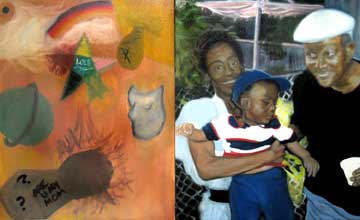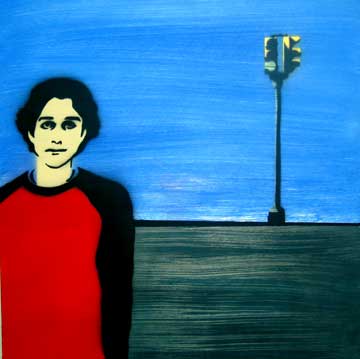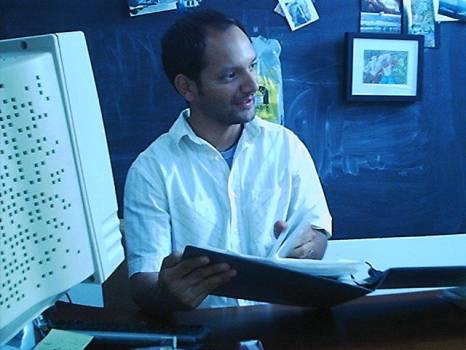| Click
above, for articles in
this issue.
City Without Walls,
An Urban Gallery Breaking Barriers
Since the
inception of our organization, we have had much to say about the City of
Newark. We have focused on the poverty of its schools, as well as the
seemingly endless plight of cases of corruption in the public sphere of local
government. Much that we have had to say has been critical; it was time
to focus on more positive aspects of the city.
Anyone who
cares to visit the city, yes, can still find much to criticize but there
are some gems, some bright and interesting places to laud. There is
a museum which can hold its own in terms of its collections, on par with
museums of national importance. There is also an international airport, a
great library, three universities, nursing, law, and medical
schools, and one may also dare to include a 'people's art
gallery.'
The Gallery
is known as City Without Walls, and recently I dropped by for
a visit which turned into an interview with Joe Ford, the
gallery's Director, as well as with William Ortega who
spearheads the gallery's ARTREACH educational program.
Some student
works included in a recent exhibition, Exhibition XIII, on display from
June 24th to July 22, 2005, are represented
below.
When
was the gallery founded ? What was the
idea behind it ?
J.F. In 1975.
Well originally
it started out as... I wasn't here at that time but, it started out as a group
of artists who realized that there wasn't space for them to show their art work
in Newark...

JOE FORD, Executive Director of the
Gallery
Were
they associated with one of the universities or were they just independent
?
J.F. They were just a
group of independent artists, and they decided that they wanted to show their
work. I think originally they began using the basement of a local
church.

Jennifer Barry,
hand colored black&wh photo 16x20
What
church was that ?
J.F. I really do not
know. The history from back then is not really available to
me.
Are any
of those original artists still involved ?
J.F. They are no
longer involved with the gallery. I believe some of them still live in
the local area.
How did
the funding for the gallery materialize originally
?
J.F. It was piece
meal in the beginning and then gradually, it built up.
So
originally the intention was to show work of certain local artists, but it
evolved into something else.
J.F. Yeah and what it
became was a place where young and emerging artists could showcase their work
and have a home for their work in Newark, so they could get their
first exposure as artists, and then hopefully move on to bigger and
better things.

Khaliqa Bell,
The Elements, watercolor 16x20
Are the
expositions stationary here at this gallery or do you also arrange for traveling
exhibitions ?
J.F. We have space
where we put art work at Seton Hall Law School here in Newark, we have three
shows a year. Annually we also have the Metro Show, and that's a traveling
juried exhibition. We have well known jurors from the metropolitan area,
Newark, New York, Jersey City, traders from museums, gallery dealers, art
critics, who will come and look at all the submitted art work and select the
actual exhibition, and then that exhibition will be on display at this gallery
and will then travel to six or seven galleries in the state of New
Jersey.
Not in
New York City ? The reason I
ask, is that there are some artists who are currently exhibiting their work in
New York City, and their curriculum vitae make reference to prior showings at
City Without Walls.
J.F. No, as I come to
think about it I think there was one showing in a small venue in New York State,
but normally, the show only travels within New Jersey.
Oh sure, al ot
of the artists move on and are able to get their work into shows at galleries
all over.
Do you
have any statistics regarding how many artists who get their start here, later
on build a name for themselves and do well in the art world ? Also
how many
artists are currently associated with the gallery
?
J.F. To break into
the New York art world is really, really difficult, for anybody. I don't
have any exact figures, but we do have a good track record of getting people
placed in other... in the course of a year we either show the work of, or get
the work of our member artists, approximately 150 to 200 member artists, shown
at some venue, if its not here.
We have between
250 to 300 people, and they are from New Jersey, New York City, Brooklyn, lower
Connecticut, all over the place.

Paul Kornegay and Ben Goldman,
Straight Up DL, oil on canvas 30x48
Is the
gallery just funded by the member artists ?
Is your funding
base pretty stable, or does it fluctuate
?
J.F. No to the first
question, we have funding from the city, we have endowments from Prudential,
Geraldine R. Dodge Foundation, and a lot of big corporate sponsors.
It (the funding)
has not decreased much. Of course we have lost some support here and there, but
overall it is pretty stable funding and we are currently anticipating a sizeable
growth in funding.
How has
the City of Newark treated the gallery ?
J.F. The city has
been great. It actually funds our educational outreach program,
which is called Art Reach.

Eric Melo,
untitled One, acrylic spray paint, 30x30
How
does it work ?
J.F. William Ortega
the education coordinator goes to all the local schools, to art classes,
gives talks about our art program; they apply through their teachers. How
the program works, is during the duration of a semester a student will work, one
on one with a mentor artist, working in the area, at the artist's studio, and
they will collaborate on a project. The collaboration will teach them what its
like to have their own studio, to be an artist, how to
survive.
Is only
one student selected ?
J.F. No, there are 15
students per year for that program. We also have 5 students who work in the
gallery as interns and we also have visiting artists who go into area high
schools and give lectures, usually 5 lectures per
year.

WILLIAM A. ORTEGA, CWW Education
Coordinator
W.O. They are invited here, they bring their
portfolio, I sift through their work and decide which students might fit into
our program...
How are
they selected, is it based on teacher recommendations
?
W.O. Yes, initially, but then
they bring their work and have an interview with me here. They are
selected not just on their artwork, it's also based on their enthusiasm and on
what we feel is their desire to actively participate. We had two students
from East Side High who excelled this year, Diana Pinho and Eric Melo.
Eric Melo was highlighted in an article in the Star-Ledger and Diana Pinho was
actually in a Cablevision interview. So both of them got a lot of
attention. They represented their High School really well. We also
had representation from Weequahic and Barringer High School, Central High, Arts
High; so a big pool of students was involved... Also I forgot to
mention University High...
How
much funding is devoted to the Art Reach Program
?
J.F. I don't have exact numbers, but
ultimately its about $20,000 for that program. Slightly more if you factor
in the Education Coordinator's salary. The basic $20,000 covers the actual
cost of materials as well as stipends which are paid to the students and to the
mentors.
How
supportive are the Newark Public Schools ? Do you have a difficult time getting
access to the classes, to students; do you get enough administrator cooperation
?
J.F. The schools work really hard and
sometimes the teachers really try hard to get the students to apply
themselves. In terms of access, it depends on the school; some make it
easier for us to speak to students, than others. With some you have to go
through several people before you can actually get talk to the
students. Sometimes its difficult, especially with some administrators who
are overwhelmed with other responsibilities, but teachers themselves are usually
great. A lot of the schools and teachers have already heard about the
program, so when we talk to them they already
know...
What is
the biggest stumbling block that the gallery is currently facing, not including
funding, everybody has always something to say about funding, so apart from the
funding issue what would you say is the biggest problem ?
J.F.
Personally,
I think the number one issue is that many people feel that Newark isn't a great
place to come to visit artwork. I think there is a stigma that has been
developed over the years about Newark. I think the city has sort of passed
the worst, the worst of its years. There is so much potential here.
This is an affordable place for artists to live; this is a great place to start
an artistic community for a lot of reasons. People have not realized,
the general art viewing public just have not yet realized how great a place
Newark can be to visit and to come to see art.
When
you do have your exhibits, how do you advertise ? Who usually comes, how
would you describe the typical visitor to the gallery
?
J.F.
When
we announce an exhibit, usually many artists come out. Don't forget we
have a thirty-year history, so there are many people who typically come to see
out exhibitions. I think since we moved to this new space, which has a
neighborhood feel to it, we are getting more people from our surrounding
community. The Gateway Center (our previous location) might have been
a little intimidating for your average Newarker, but here our doors are
always open, anyone can come in and I think that is changing. In general I
think we would like to get everyone who is interested in seeing art, feel like
they can just stop in at City Without Walls and see some really cool
work.
Is any
of the art for sale ?
J.F. Yes, generally everything is
available for sale, and anything that is sold 30% of the proceeds is retained by
the gallery and the remaining 70% goes to the artist. That percentage
breakdown is something that most of the artists have been quite happy to be able
to do.
Wasn't
your prior location at the Gateway Center more amenable for the selling of
artwork, than this location
?
J.F. Selling yes, but commercial
space in that part of downtown Newark tends to be very expensive. Although the
Gateway Center management was very good to us, they allowed us to remain there
for fifteen years, but I think, it came time that they needed to make more
money, and we needed a bigger space, and it would just be impossible to come by
it down there. But people have really taken well to this area, and we are
really happy to be now the 'anchor' for the redevelopment of this neighborhood,
as an art and cultural
district.
How
many shows a year do you make available ? And how many artists are typically
included in the exhibitions
?
J.F. Including our shows at Seton Hall Law
School, and the traveling exhibition, we have about fifteen shows a year.
Also between exhibitions, we also have other things going on, like poetry
events. Per show we have anywhere from 5, to the Metro show which
may have as many as 70 artists
included.
What is
the cost to the artist to be associated with the gallery and to be involved in
the exhibitions
?
J.F.
Membership
in the gallery is $25.00 at the basic level per year. If you are a senior
citizen or a student, its only $15.00. Its been that way for twenty
something
years.
May any
member show their work
?
J.F. Membership grants you the right to
put your slide, and images of your artwork into the gallery's database.
And that database is the source for the curation of exhibitions here.
Do you
have any intention or plans to expand into other areas of the city
?
J.F. Right now this is our home, and we
are really happy with it. We have been here only two years, but we do plan
on expanding our services greatly in the next few years. We are hoping to
place our entire database onto our website and have a really strong web
presence, so that anywhere in the world you may be, one can access the web site
and see what the artists are doing in
Newark.
City Without
Walls is located at 6 Crawford Street, in the Lincoln Park area of Newark,
just a few blocks from City Hall.
They are open
Wed. to Fri. 12-6, and on Sat. 1-6
www.citywithoutwalls.com
Joe Ford originally from Arkansas, attended the
University of Illinois and has been with the gallery for two years as its
Director.
William Ortega a Jersey native, studied
at Rutgers University, Mason Gross, where he majored in fine arts,
video and photography. Besides his position as Education Coordinator
at City Without Walls he is also an instructor at Middlesex County
College.
by Victor
Saraiva
Editor
We
would like to thank Joe Ford and William Ortega as well as the City Without
Walls gallery for allowing us to reproduce several
works from Exhibition XIII, as well as for their candor in the
course of this interview.
Posted August 22, 2005
URL: www.thecitizenfsr.org
SM
2000-2011
You are here: HOME page-OLDER ISSUES-AUGUST 2005 -Focus on Newark, NJ
Previous : Dispatches from Iraq Next : In Retrospect
|